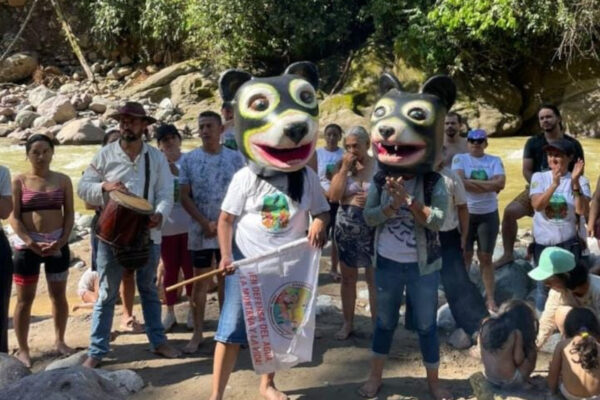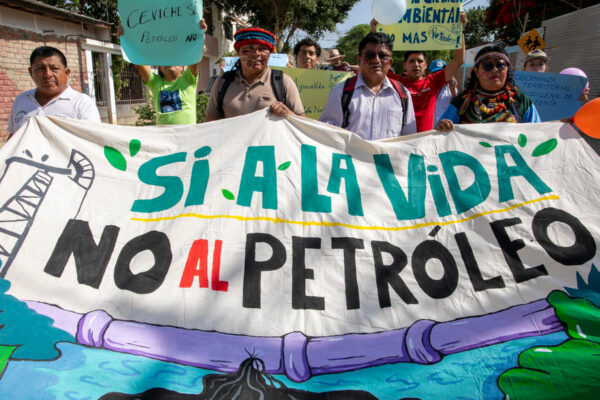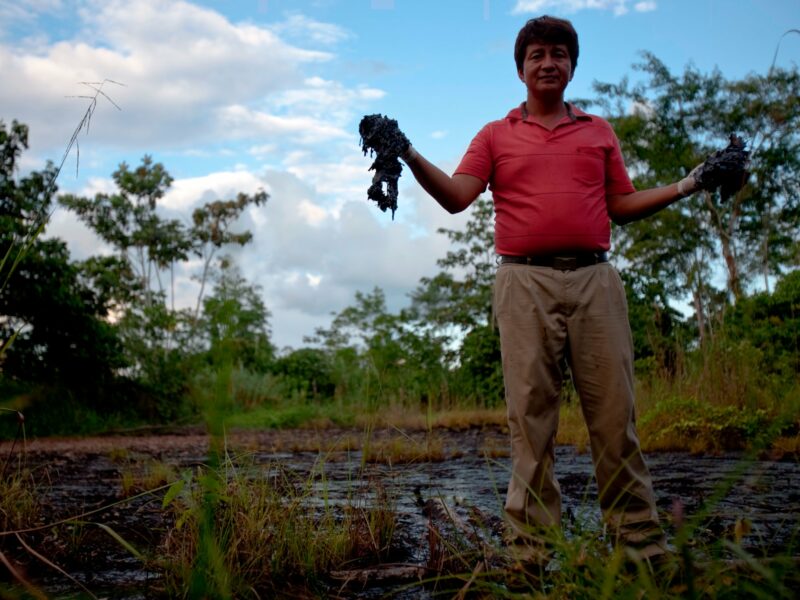“I’m very happy because, finally, justice has been served. We’re going to restore nature, for all the sick children, for the people, for the parents who have fought to stay healthy, for the families that have also kept fighting if only to grow a few crops, for the families who live under the flares and have had to abandon their land,” says 10-year-old Leonela Moncayo. She had just found out that, on Jan. 26, 2021, a court in Ecuador had ruled in favor of her and eight other girls who had demanded the elimination of flaring by the oil industry to burn off natural gas in the Amazon, particularly in the provinces of Sucumbíos and Orellana.
At an average temperature of 400° Celsius (750° Fahrenheit), the flares have been burning natural gas, a by-product of oil extraction, since Chevron-Texaco drilled the area’s first commercial well in 1967. The plaintiffs said their relatives and friends had developed health problems, including cancer, due to the air pollution caused by flaring, and that some had even died.
A 2017 study by Clínica Ambiental, a project of the Centre of Studies and Social Action (CEAS), and the NGO Acción Ecológica indicates that there were higher incidences of cancer in the population of the Ecuadoran Amazon that lives near the areas where Chevron-Texaco operated and where oil facilities, and flares, are found.
Pablo Fajardo, a lawyer who represents the girls and the Union of People Affected by Texaco (UDAPT), says that UDAPT and Clínica Ambiental spent two years compiling records of cancer cases in Sucumbíos and Orellana. They documented 251 such cases, with women accounting for 71% of them.
“These girls who today were petitioners could tomorrow be victims of cancer,” Fajardo says.
The long path to justice
“We had a friend the same age as me, 13, who died of cancer two and a half years ago,” says Yamileth Jurado, one of the plaintiffs. “Like her, many others have died. The people who work in the oil industry don’t understand that they are slowly killing us. The state doesn’t understand that they are taking oil from here and so should, at the very least, provide us with a hospital.”
In January, the Sucumbíos Provincial Court ruled in favor of the petition filed by Jurado, Leonela Moncayo and seven other girls, and ordered that the flares be shut down. But getting to this point wasn’t easy. (Read the report in Spanish here: “Apaguen los mecheros”: niñas acuden a la justicia para frenar la quema de gas en la Amazonía de Ecuador)
On Feb. 20, 2020, the girls had filed an injunction against the Ecuadoran Ministry of Energy and Non-Renewable Natural Resources and the Ministry of Environment and Water, arguing that the impact of the flares violated their rights to water, health, food sovereignty, and a healthy and ecologically balanced environment. They said the flares had negatively impacted the health of residents, contaminating the rainwater that was their only source of clean water.
But on May 7, the injunction was denied. The court reasoned that no studies had confirmed that flares have negative health impacts.
Alfredo Maldonado, who has a doctorate in collective health, environment and society from Simon Bolivar Andean University in Quito, told Mongabay Latam this argument was absurd because such studies do exist, though they hadn’t been carried out by the Ministry of Public Health (MSP).
Vivian Idrobo, one of the girls’ lawyers, said the lack of MSP studies was proof of the state’s negligence.
Following the denial of the injunction, the girls filed an appeal. The families and the lawyers agree that the months that followed were the most difficult, and at one point, they didn’t think they would succeed. The second hearing, originally scheduled for June 25, 2020, was postponed five times. There was an atmosphere of uncertainty and the girls had to wait almost four months for the ruling. It was finally held on Oct. 2.
The Jan. 26, 2021, ruling agreed with the petition laid out by the girls and their attorneys, saying, “the Ecuadoran State has ignored the right of the petitioners to live in a healthy and ecologically balanced environment, disregarding their right to health with polluting activity, by not providing or promoting the use of environmentally clean technologies and non-polluting, low-impact forms of energy.”
Carmen Samaniego, the mother of one of the plaintiffs and herself a cancer survivor, says she is happy the judges ruled in their favor. She says the state violated the girls’ rights and asks that they provide reparations.
“This is a great victory not just for the nine girls but for the whole country,” Samaniego says.
For María Espinosa, a lawyer with the NGO Amazon Frontlines, this ruling is another historic victory for the rights of communities, in line with decisions in similar cases in Ecuador. In 2019, the Indigenous Waorani prevented oil drilling in Block 22. That same year, the Indigenous Kichwa of Santa Clara persuaded a court to halt the construction of a hydroelectric power station on the Piatúa River because they had not been adequately consulted about the project before it began and it had a flawed environmental impact assessment.
Monitoring required to ensure compliance
“This ruling is historic because it recognizes the violation of several rights: health, nature and a healthy environment,” Espinosa says. “And it recognizes that the Ecuadoran state has also systematically violated international obligations, in this case, in the fight against climate change. It requires oil companies to change their procedures and standards to make them clean and safe.”
The state criticized the lawsuit throughout the process, arguing that it was detrimental to the oil business and that if the judges ruled in favor of the girls, “Ecuador’s economy will collapse.”
But lawyer Pablo Fajardo says the lawsuit did not demand the suspension of oil drilling, only the cessation of flaring.
Fajardo and his colleagues say the ruling is a success for the girls and Amazonian residents who live near the flares. However, they said they are concerned that the decision will not be implemented because the decision did not specify when flares should be shut down or how the practice of gas flaring should be changed.
“What we want is to shut down the 447 flares currently burning gas. Getting rid of them requires new alternatives, which were considered in the petition. The gas could be allocated for domestic use, taken advantage of for power generation in oil facilities or re-injected,” Espinosa says.
The communities say they hope another hearing will follow to determine how affected residents of Sucumbíos and Orellana will be compensated. And Espinosa says she hopes reparations will be accompanied by health care for more than 250 people who are currently suffering from cancer and who were part of the research carried out by UDAPT and Clínica Ambiental.
The girls, their relatives and the lawyers say this decision from the court will bring benefits in terms of health, the environment and even the economy. Espinosa says the ending of flaring will reduce the incidence of diseases such as cancer that are associated with the burning of gas. That decrease will in turn reduce pressure on already stretched health care services in the Amazon.
Fajardo says that each year, the Ecuadoran state spends more than $600 million on gas imports.
“Flares burn more gas in a year than the needs of the entire country, and we could take advantage of this,” he says.
In their decision, the judges also noted that eliminating flaring would cut Ecuador’s greenhouse gas emissions by at least 24%.
The girls are asking for the ruling to be implemented immediately because they have spent years fighting for the federal government to require that public and private companies use cleaner technologies in the most oil-intensive area of the country.
“There are flares two blocks from my house. [Government officials] live far away from here and don’t breathe the smoke,” Yamileth Jurado says. “Many people don’t pay us any attention because we’re poor. We don’t have money. They think we’re nobody. But the flares must go. People are dying because of them.”













